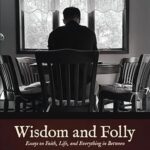You know no one like Rob Marco. You’ve never met anyone like him, and likely never will. Some days, it seems even he’d like to meet himself. And it is for that reason – the constant, quixotic, and exacting probe of his inner self to plumb the depth of what keeps one from living a virtuous life – that I propose, dear Catholic Exchange reader, that you get to know him and his writing as soon as you are able.
And you will get to know him. In fact, you will come to know most everything you can about a person you’ve never met in the 389 pages of his exceptional book, released today, titled Wisdom and Folly: Essays on Faith, Life, and Everything in Between (Cruachan Hill Press, 2024). Marco’s book reads both like an omnibus and an endless climb up Pike’s Peak to know the intimate recesses of God’s heart. The author, of course, knows he’ll never get there this side of heaven, but Marco is one of those types who keeps pushing through the clouds on the ascent so he might at least beg of God the Father a single request: Show me, precisely, Your will – and give me the grace to carry it out. If you read Wisdom and Folly, unhurriedly and with care, you will find yourself making the same request.
Pennsylvania’s mild-mannered and long-bearded writer has written more words than there are in a priest’s breviary for the past twenty years. The 43-year-old married father of three cannot not write – so Marco writes and writes – every single day if he’s able and even when it’s not his day job.
If I can surmise, this is as much a cross as it is a grace. The astonishing thing is that throughout his twenty years of blogging “on the side,” he always seems to have a unique and incisive admonition or cutting insight into the spiritual life, what it means to be a man, holding fellow Catholics and the Church to a higher bar, and encouraging disciples along the road to Calvary. In my reading of Wisdom and Folly, I often found myself mentally stopping in my tracks, dog-earring a page, laying the book aside, and starting a prayer. This is a man who ruthlessly seeks to know the Lord so that he can better know who he is made to be, to lead by example without duplicity, not sparing himself from the rigors of self-examination without being a navel-gazer, and offering the gifts from this crucible for the world at large.
Wading into his broad and often piercing considerations, I found myself being hand-led into what seemed an incorrupt garden. In the same fashion a farmer must beat back earwigs, gophers, and nibbling rabbits from befouling his bounty, Marco leans on his philosophic bent, vulnerability, and ferocious love for God to ward off temptations to cede ground on illuminating the raw truth of Christ and his pilgrim Church at a time in history when many Catholics are walking away from it. Reluctant readers willing to put their trust in an unknown author will be rewarded by essays written by a humble man with an open heart. He writes only where the Holy Spirit leads him. Unlike some modern Christian writers, Marco’s essays are not birthed from a tinny faith or spiritual myopia – his wisdom and thoughts seem to be a demonstration of grace given by God to a writer adept at articulating truth, encouragement, and offering potential solutions during troublesome times.
The oddest thought struck me while reading Wisdom and Folly – the tender manner of Marco’s writing style seems as if it could have belonged to any one of the Lord’s disciples or saints during Christ’s lifetime–someone following in His footsteps as closely as he can and writing about it along the way. Over and over in his essays, Marco seems to benevolently search out nuance with sinners, the unformed, and under-catechized without ceding an inch on God’s revealed Truth, His sovereignty or what he, himself, knows to be God’s will as revealed by the scriptures and His Bride, the Church.
I imagine I’ve read a few hundred books by Catholic authors, from the patristics and Augustine to the latest from Fr. Jacques Philippe and Michael O’Brien. I have never read anyone as vulnerable as Marco. He writes like a skywriter in a jet plane, humbly proposing for the world past foibles, sinfulness, humiliations, and even closely-guarded secrets – not for the purposes of self-adulation or deprecation for its own sake, but as a “whatever it takes” tool in the toolbox to help lead souls to Christ more authentically, more fervently, and in greater charity. As St. Paul writes, “to be all things to all men…so that some may be saved.”
And this is the magic of Marco as a writer. It is his gracious and subtly masterful trick of fully exposing himself that sinks the hook into readers’ minds and allows him to propose what a holy and ordered Catholic life looks like; though it is uniquely his, it is also the common struggle of all of us–to be who we are and be that well (in the words of St. Francis de Sales). In wading into Marco’s innermost thoughts and experiences, readers are exposed to what he has learned the hard way – and see clearly that he has found his footing. More accurately, God seems to have made his home in Marco’s once-restless soul.
Marco’s search for God led him to make a cross-country bike ride and into trading thoughts with the Hare Krishnas. He has slept peacefully at nights in a Benedictine monastery, where he considered becoming a monk. He battled agnosticism, discovered the unwelcome mental demons of depression and anxiety, rediscovered God, and later found himself preaching Christ, the Gospel, and what he calls “full-throated Catholicism” as a public street evangelist. He lived briefly as a would-be hermit in a converted school bus on the streets of Philadelphia and ran a Catholic Worker house, where the tinniness of prayer-thin social justice work began to pound at his conscience like endlessly howling winds.
Mankind needs more books like Wisdom and Folly. We are in dire need of more writers like Marco. Why? It is no mystery that factions are growing in the Church and world. This isn’t the time or space to comb over splinterings in the Church, but what Marco accomplishes in his first book (we hope this is the first of many) is a “third way” of attaining a holy and ordered Catholic life. Simply, he does this: his musings are kind, gentle, and humble. Just one example: although Marco attends and has come to love the Mass celebrated in the Extraordinary Form, he does not judge the Novus Ordo Mass or those that attend it. In these days of fractiousness, that is saying something!
His essays point Catholics away from the peripheral and subliminally scream for them to repent, to lay their heads against Christ’s heart, and to begin anew. As Marco himself has attained a settled peace after his searching years, he cheerfully urges readers toward the same sacred blueprint of renunciation of self and total union with Christ and devotion to His Church into which he’s invested half his life since becoming Catholic at the age of eighteen. A large part of sainthood demands humbling oneself and baring all, and Marco does this and more through naked, vulnerable, challenging and humorous storytelling.
It is no surprise that St. Philip Neri – the patron saint of Joy – is among Marco’s favorites. He writes: “St. Philip took the “organic approach” to cultivating friendships and relationships across social and class lines. … He loved going out into the streets and talking with people; he took a very personalist approach to this. … Humility, humor, and a love of people–these are the things I find myself so drawn to in St. Philip Neri. —-We are living through a great leveling of the Church in the culture, and we need those on the ground to go out amidst the rubble and get to work rebuilding from the ground up.”
Although Marco was writing about the Italian saint – make no mistake – he was writing about himself. Since opening himself to the fullness of the Father’s love after his conversion to the faith in high school, he’s been a serious-minded but joy-filled and radical evangelist – who in his Kerouac-like travels across America has often noted an absence of joy and fervor. You will see in Wisdom and Folly that Marco is unafraid to write about the joylessness and lack of fervor to which he’s paid witness – while using his own life as a test subject and buffer. Over and over in his essays, he demonstrates the various ways of attaining lasting joy through scripture, the saints, the Church and Christ’s own words. The cross, a commitment to sacrifice, a Marian mindset, a proper understanding of conjugal love, and adoration of the Eucharistic face of Christ are just a few of the sacred remedies Marco writes of and identifies as having brought himself closer to God’s embrace.
Again, for the reader reluctant to yield to an unfamiliar author’s thoughts and philosophies – you are in safe hands. Marco is an old soul who swims against the current. Unlike many writers, Marco is not on social media, knowing full well that an online presence offers a way of spreading awareness of things such as a new book. He trusts God to do the work of getting this book into the hands of those who can be graced by reading it – perhaps with a book review thrown in here and there.
My advice for those who will purchase his book: take in an essay or two with your morning or evening prayer, close your eyes, and meditate on where the Lord “took you” through Marco’s often penetrating thoughts. In time, you might see where a particular essay in Wisdom and Folly has become a personal invitation from God to see a blind spot, convert, and to come to know Him in a more intimate way.
Lastly – but vitally for readers to know – Marco is a writer intensely devoted to meditative prayer, scripture, penances, spiritual reading, and ordered living. In getting to know him a bit, I’ve come to regard him as perhaps the least arrogant man I’ve met, the kind of neighbor who seems to lay in wait for you to ask for a cup of sugar or a stick of butter.
“We are being ransomed, all of us, in dribs and drabs,” Marco writes of the movement of God’s grace. “The best we can do is labor, scatter, till, and fertilize. … But isn’t it a wonderful thing to see a flower bud, a tree bear fruit, in its due season?”
In Wisdom and Folly, chances are you find these “wonderful things” budding or becoming lodged deeply into your own soul. It did for me – and I am grateful to Rob Marco for having planted and scattered that seed. Over and over, I was led to go about the business of purchasing that treasured field and to never look back.
Wisdom and Folly: Essays on Faith, Life, and Everything in Between is available from Cruachan Hill Press.












